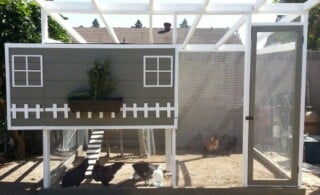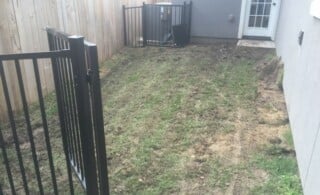
When you think about home improvement, livestock may not be the first thing that comes to mind. However, as our society turns to re-embrace sustainability and self-reliance, some families are choosing to renovate their outdoor spaces to accommodate small livestock, like chickens, sheep, and goats.
When it comes down to it, the initial considerations for whether you should add a hobby farm to your property and whether to install a pool, patio, or outdoor kitchen aren’t that different. Time, money, and upkeep are the primary concerns. Of course, living creatures require much more care than patio furniture, and sheep don’t come with a return or exchange policy.
So, before you make the long-term commitment to raising sheep, be sure you’re aware of the good, the bad, and the ugly. Moreover, you should make sure you know what preparing to add little lambs to your family — and your property — really looks like.
Pros
Whether you’re raising sheep for their wool, their meat, or their milk, there are a lot of potential benefits for the amateur farmer who is looking to start or expand their homesteading efforts. The list below, while not exhaustive, will most certainly leave aspiring shepherds with warm-fuzzies about their future flock.
- Size – Smaller livestock needs less space and time, as well as fewer resources than cows, horses, and pigs. For hobby farmers who don’t have the time or space to devote to larger animals, sheep are an excellent choice.
- Versatility – Poor soil? No problem. Sheep aren’t picky. Since they’ll eat just about any brush, grass, or weeds, they can survive and thrive in imperfect pastures.
- Fertilization – Speaking of soil, sheep manure is a superb fertilizer. Even in a backyard setting, you can rotate the location of your sheep and your garden to take advantage of the natural compost.
- Pet-like qualities – Gentle, docile, and trainable, sheep are more like pets than livestock. This makes them perfect for families with children, and it also means they can get along with other animals you are already raising, like chickens.
Cons
Sheep may sound like perfectly productive pets, but a backyard full of the wooly, hooved creatures still has its disadvantages. While the positives will likely still outweigh the negatives, it’s important to consider the following drawbacks before you invest in ewes.
- Susceptibility – There are few farm animals more vulnerable to predators than sheep. Depending on where you live, anything from a bear to a bobcat to an unfamiliar dog may be a threat to your flock.
- Parasites – Sheep are also susceptible to parasites and must be wormed monthly. You should also inspect their eyes, skin, and horns regularly to check for disease and infection.
- Rebellion – Some sheep like to play by jumping over or running through fences. Since sheep are followers, one rebel can lead to a lot of time and energy spent rounding up the entire flock. Moreover, escaped sheep are more likely to ingest a poisonous plant or sustain an injury.
- Noise – Loud bleating, cud chewing, and even just digesting may well be audible from inside your home if your sheep are right outside.
- Cost – Sheep aren’t cheap. In addition to the $75- to $250-each purchase price, feeding them, housing them, and caring for them can get expensive. You’ll also pay to have them slaughtered and prepped for meat or sheared for wool, which you will need to subtract from the $1.40 to $1.80 per pound you’ll sell your meat for and/or the $1.50 per pound for wool.
How to Start a Sheep Farm
If you’ve read all of the above and you still want to be a shepherd, the following checklist will walk you through your next steps. From choosing the best breed to fending off predators, a thoughtful and thorough approach to each and every action item is a must for a happy, healthy flock.
1. Choose Your Breed
The first step when it comes to choosing the breed of sheep you will be welcoming into your home is figuring out how you are going to use them. That’s because different species of sheep are good for different purposes — namely meat and wool but sometimes milk as well.
Common Sheep Breeds by Purpose:
| Purpose | Species |
|---|---|
| Meat only | Hampshire |
| Katahdin | |
| Suffolk | |
| Meat & wool | Corriedale |
| Dorset | |
| Polypay | |
| Tunis | |
| Columbia | |
| Romney | |
| Dairy | East Friesian |
| Lacaune | |
| Awassi |
Other considerations include size and natural habitat, so be sure you have the space and the climate necessary to accommodate your breed of choice. No matter what type of sheep you choose, look for individual animals with bright and clear eyes, healthy teeth, and no lumps in the head or neck — this is a sign of untreated worms, as are potbellies. Your sheep shouldn’t be too thin or too fat, and a ewe’s udder should not be lumpy.
Your best bet is always to purchase a sheep directly from the farmer who raised them, and you should ask to see the rest of the flock as well as the animal’s parents. Limping may indicate hoof rot, which can infect your other sheep, and hooves that have been improperly trimmed may indicate a lack of care. If you want to play it extra safe, have a veterinarian take a look at the sheep before you purchase them to ensure they are healthy.
2. Give Them a Safe & Comfortable Place to Live
Once you’ve chosen what type of sheep will live on your property, you must create a safe space for the flock. The good news is that these simple creatures really only require three things in the way of accommodations:
- A simple shed with three sides, facing south, is enough shelter for most sheep. When determining the size you need, allow 15 to 20 square feet per adult. A barn builder in your area can fashion something lightweight and mobile so that it can move with your flock as you rotate their pasture. If your ewes give birth over the winter, you will also need an enclosed structure to protect the lambs from the weather.
- Ample shade is necessary in hot climates and during warm summer months. Natural shade from trees will work if it’s available. If not, an open structure and plenty of cool, clean drinking water will allow them to escape the sun and beat the heat.
- For animals who love to jump and ram their way out into the wild, blue yonder, a sturdy fence is an absolute must. A medium-gauge wire fence, either smooth-wire electric or woven-wire non-electric, is strong enough to keep your animals where they are supposed to be without causing them injury.
3. Keep Your Sheep Well Fed
Sheep are not known for their refined palates. They will happily graze on grasses, brush, and trees, and you’ll need about an acre of pasture for every four sheep. In the winter, you’ll likely need to supplement their diet with hay or grain, granulated or loose salt, and a vitamin formulated specifically for sheep. Always use a raised feeder to keep hay off the ground and prevent mold and infestation.
4. Improve Herd Immunity
Like any animals that live in close quarters, parasites and disease can spread quickly among a flock. So, when it comes to conditions like worms and foot rot, prevention is key. Rotate pastures every two to three weeks and keep an eye out for any signs of infection. Build a relationship with a vet who specializes in sheep and goat care to tend to the health of your flock.
5. Protect Your Flock from Predators
To significant-sized carnivores, your flock of sheep is like sitting ducks. Luckily, there are several steps you can — and should — take to address your sheep’s vulnerability to predators, including:
- Keep guardian animals, such as pet dogs, donkeys, or llamas.
- Install nighttime lighting, and use high, secure fencing.
- Breed your animals to lamb in late spring or early summer, when other food sources (like rabbits and rodents) are more plentiful.
- Place bells on your sheep so that you can hear if they start to run. High-frequency bells may deter dogs.
- Keep your flock as close to your home at night as possible so you can keep an eye on them.
- Use live traps to catch and release potential predators without harming them.
After reviewing the pros and the cons, it’s clear that sheep can be a useful and significant addition to any big backyard or a small farm. As long as you are ready and willing to invest in the resources required in your sheep and your space to keep the animals happy and healthy, you’ll likely get as much joy — and much more wool, meat, and milk — out of them as any other outdoor home improvement project.
 Raising Chickens at Home
Raising Chickens at Home  Spring Garden Flower Tips and Suggestions
Spring Garden Flower Tips and Suggestions  Plan Ahead for a Better Yard
Plan Ahead for a Better Yard  8 Water-Saving Home Renovations
8 Water-Saving Home Renovations  How Much Does it Cost to Install or Assemble Fitness Equipment?
How Much Does it Cost to Install or Assemble Fitness Equipment? 

Are You Familiar With This Topic? Share Your Experience.